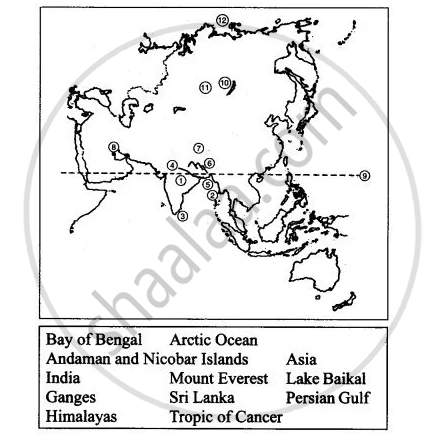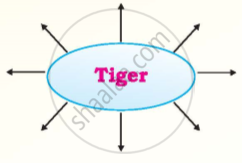Advertisements
Advertisements
प्रश्न
As a Conservationist, write a report to the World Wildlife Federation, based on 5. Remember 'CODER'
| From: (your name), Conservationist. To: The Chairman WWF (Date) (Suitable Heading) (Suitable introduction) e.g. You recently asked me to submit a report on my study of YAK - in particular, their future. The following are my findings and recommendations. 1. The current problem. 2. Reasons why this problem has arisen. 3. Effects of the problem 4. Recommendation 5. Conclusion (Suitable ending, including other ideas for increasing YAK population) Your name (Conservationist) |
उत्तर
From : Anmol Sexana, Conservationist.
To : The Chairman
WWF 05/01/20XX
Subject: Status report on Yak of the Himalayas
Dear Sir
This is with reference to our earlier discussions regarding status of yaks and plans for a better future for them in the Himalayas. The following are my findings and recommendations :
As you may be aware, currently, yaks are limited to the upperlands of the Himalayas. But the area of their habitat is shrinking at an alarming rate.
We will also empathise with the plight of yaks. They are facing a loss of their habitat and increased danger of poaching from humans. There is every likelihood that a day will come when yak will be an extinct species like Dodo.
I want to request you to take proper steps to improve the ground situation. Certain area can be earmarked as reserve area for yaks. Local people should be educated about the problem and taken into confidence. You will agree with me that people participation is important for the success of such programmes. The reserve area should be manned with people with relevant skills to implement the protection programme as per plan.
As yaks are facing a real danger to their existence, a concrete conservation programme needs to be chalked out in the Himalayan region. Apart from that other suitable areas should be discovered for expansion of yak population. As the most advanced species of this planet this is the responsibility of humans to take care of other living creatures of this planet. Anmol Saxena (Conservationist)
APPEARS IN
संबंधित प्रश्न
Roads are fascinating as metaphors for life, change, journeys, partings,
adventure, etc. or simply as roads. This is probably why they, and all their
attendant images, have permeated art, literature and songs. In the poem, Frost
uses the fork in the road as a metaphor for the choices we make in life. Thus the
roads are, in fact, two alternative ways of life. What other nouns, according to
you could be used to represent life?
River
________________
________________
________________
________________
________________
Answer the following question.
"I am like earthly life … "
Why does the poet compare rain to earthly life?
Answer the following question.
With reference to the poem, how can you look after your teeth?
Read the following extracts and answer the question that follow by choosing
the .correct options.
'While you were upstairs, I have been thinking a lot about your Papa and Mamma.
(a) What is the discrepancy between what Gaston said earlier and what he says now?
(i) Earlier he did not want Juliette's parents to stay with them but now he is
showing concern for them.
(ii) Earlier he wanted Juliette's parents to stay with them but now he does not want
them to come over.
(iii) Earlier he wanted to buy a house for them but how he wants them to come and
stay in their villa.
(iv) Earlier he stayed in Juliette's parents' villa but now he wants them to stay with
him and Juliette.
(b) What does the above statement reveal about Gaston's character?
(i) he is selfish.
(ii) he is an opportunist.
(iii) he is a caring person.
(iv) he is a hypocrite.
Imagine that you are on an uninhabited island with a group of children of your age. In groups of four, discuss and enumerate the strategies that will be adopted by you to survive. You can think on the following lines :
| food | protection against animals |
| shelter | life-skills (problem-solving, decision-making) |
| means of escape | protection against harsh weather conditions |
“Living conditions have been improving….”
Key
——- Number of children in secondary school.
——- Number of people dying from malnutrition.
——- Number of homes with running water.
——- Number of women working outside the home.
Write a report on the changes in living conditions in Medland between 1950 and now. Suggest reasons for these changes. Use the present perfect continuous where necessary. You may wish to use the words in the vertical box above right.
(b) The number of homes with running water has been rising sharply since 1985, whereas
Look at the numbers on the map, and match them with the names given in the box below.

In pairs discuss the qualities and characteristics of the tiger and man. Complete the web charts. 

Here are the stories of the two boys. One student reads the story of Shravan Kumar and the second student reads the story of Narendra Kumar. After reading the story, each student completes bis or her half of the table in Question 3.
SHRAVAN KUMAR
His day begins when most other people's day ends. Thirteen-year old Shravan Kumar works in a tea shop on Delhi's Bahadur Shah Zafar Marg, where several newspaper offices are situated. His work begins around seven in the evening when he starts preparing samosas, coffee and tea. He carries them to several offices, does the dishes, and goes around collecting his money well into the night. Around six in the morning, when all the newspapers are despatched for distribution and the press employees return home, he prepares his food, takes a bath and goes to bed.
Shravan is an orphan who crune to Delhi from his village in search of work. His father kept a shop, but was tricked out of it by a deceitful uncle. Despair drove him to alcohol and grunbling, and he died of a stroke soon after.
Shravan worked in a tea shop in his village for a while. "When I first began washing other people's cups and glasses", he recalls, "I used to feel very bad, I would cry."
Shravan moved to the more lucrative environs of Delhi, where his elder brother Shatrughan had preceded him. Ajob in a shop selling ice was his first taste of big city life. His mother crune to visit him in Delhi, but she fell ill and died soon after. "That was two or three years ago. I don't remember exactly when," the little boy says. Soon, Shravan lost his first job. His employer still owes him Rs 500.
Following a brief spell of unemployment and a short spell as an assistant at a car park, he joined the tea shop where he is presently employed. The ruthlessness and loneliness of the world has left him shattered. "I think I run all alone in this world," he says despondently.
Of the Rs 300 that he earns every month, he deposits Rs 200 in the bank. His bank balance stands at Rs 2000, he says proudly. Survival is his immediate aim but there is a larger objective towards which Shravan is working. He intends to retrieve the land that was mortgaged by his father. Already Shravan and Shatrughan have paid back the loan of Rs 8000 - only the interest remains to be paid.
Shravan was a dedicated lotte:ry buyer at one time; until he realized that it was adding nothing to his income. The cinema remains a favourite form of entertainment - he even wakes up early to see the noon show. "I have no friends here. Who keeps awake late at night and sleeps during the day? I miss my village. There, I used to play gully danda and marbles and I had a lot of friends. When I went to the village last year, I met them. They are still studying and playing games. I want to join them, but it is a question of survival for me."
Sharvan's mother wanted him to own a big shop - "like the one his father had owned," he says wistfully. He dreams of fulfilling her wish. He dreams of getting back their mortgaged land, and returning to the village for good, "I like being in my village. I like the films and the glitter of Delhi, but I prefer the greene:ry, the trees, and the fields of my village." Maybe the grit and intelligence he has shown, alone and friendless, in facing a hostile world, will also win for him his heart's desire.
NARENDRA KUMAR
Narendra Kumar, a thirteen year old Kendriya Vidyalaya student, was interviewed by The Illustrated Weekly of India. Read what he says about himself.
Interviewer : Hello, Narendra!
Narendra : Hello!
Interviewer : Congratulations! Narendra. I saw your photograph in the newspaper last week, when you won the Soviet Land Nehru Award for drawing and painting. Our readers are anxious to know more about you.
Narendra : Thank you, Sir. I think I was just lucky to get the award. The competition is held every year in my school and a large number of students take part in it.
Interviewer : That's good, very good. It's evident that your school encourages students to take part in various activities.
Narendra : Oh yes. Our teachers -especially my Art teacher, Mr. V. Sinha - gives us a lot of encouragement. My parents have encouraged me a lot, too.
Interviewer : When did you start painting?
Narendra : When I was three, I was attending the Shishu Vihar Nursery School. My teacher gave me a picture of a big kite one day. The picture was beautiful and that very day I asked my father to buy me some crayons and drawing paper... Soon my room was full of crayons and paper! I kept drawing whenever I found time. I now have a mini art room of my own at home!
Interviewer : That's great, really great! Do you want to become an artist when you grow up?
Narendra : No. Drawing and painting are just hobbies, which give me a great deal of pleasure. I want to become a police officer when I grow up. That's the only thing I've ever wanted to be.
Interviewer : Is that because your father is a police officer?
Narendra : Yes, maybe. I've been watching my father and other policemen for a very long time. I suppose I want to be like him!
Interviewer : Do you feel you have the qualities that a good police officer needs?
Narendra : Yes, I think so. A good police officer needs to be physically fit and mentally alert. I'm trying my best to grow into a healthy young man. I'm a member of the local sports club. I play tennis in the evenings and I also swim regularly.
Interviewer : How do you find time for all these activities?
Narendra : Well, I suppose I'm busy the whole day. Immediately after school I like to paint or play. I study before dinner and usually get to bed at about 10 o'clock.
Interviewer : Thank you, Narendra. It's been good talking to you. We wish you success.
Narendra : It's been a pleasure
Now prepare a graph based on the students' response to the survey you conducted in Question 2. Then write a report for the newspaper taking the help of Question 5, Question 3 and Question 6. You may follow this pattern:
Paragraph 1 : A suitable introduction as in B.4.
Paragraph 2 : Hours per week spent on different activities - classes VI, IX and XI compared.
Paragraph 3 : How extra time would be used - Classes VI, IX and XI compared.
Paragraph 4 : Boys and girls compared - Classes VI, IX and XI
The following words and phrases will be useful to you:
To express proportion
Most __
Many __
The majority of ___
A large number of ___
A small number of ___
Very few ____
Only a few ___
To express frequency
Most of the time ___
Frequently ___
Occasionally ___
Often ____
At times ___
To express comparison and contrast
__ compared with __
On the other hand, ___
In contrast, ___
By comparison, ___
___ however, ___
____ in comparison with ___
You may also find some of the phrases from B.5 useful.
